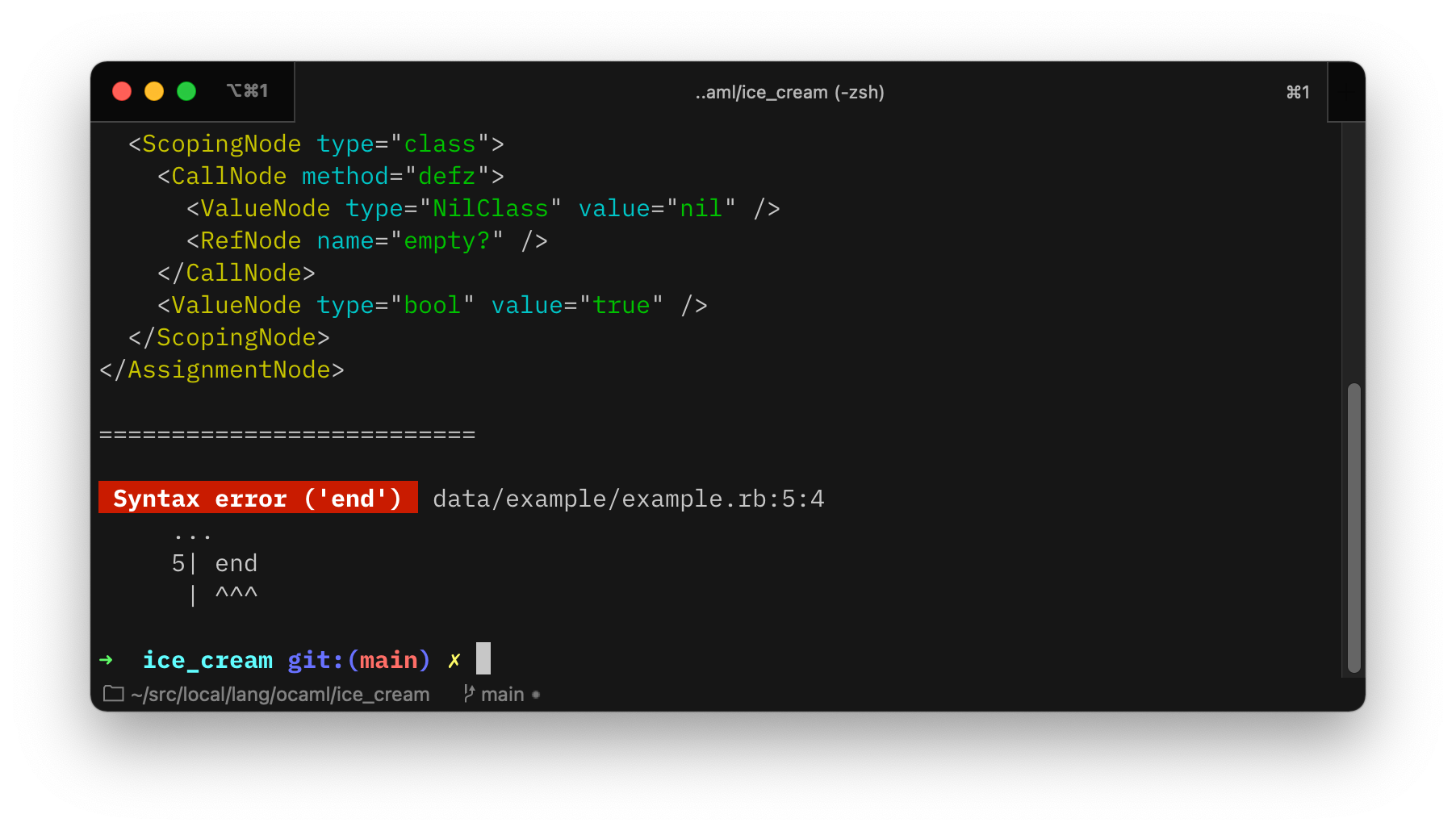- Ruby parser
- Parse RBS files to build library of type interfaces
- Compute algebraic subtyping annotations (+/- flows)
- Apply constraints to type annotations
$ make build
dune build bin/cli.exe
$ make run
OCAMLRUNPARAM=b dune exec bin/cli.exe -- --dir=data/example
Importing file: `data/example/example.rb`
Importing file: `data/example/rbs/example.rbs`
...$ make build
dune build bin/cli.exe
$ make check
OCAMLRUNPARAM=b dune exec bin/cli.exe -- --dir=data/example --check
Importing file: `data/example/rbs/example.rbs`
class Example #empty? (bool) -> boolSee Kitchen Sink demo for supported syntax, but this is a non-exhaustive rough list of what doesn't work yet:
# string interpolation
"Hello, #{name}"
# curly-braced do-blocks
foo { |x| x.bar }
# object method calls without parens
x.foo true
# heredoc
<<~MSG
Hello, name!
MSG
# heredoc method call
<<~MSG.trim
Hello
world!
MSG
# ambiguous do-block
foo bar do |x| # block belongs to foo, not bar!
x.baz
end
# trailing commas
{
foo: :bar,
}
# operators
x | 0
a + bInput
module ChatApp
VERSION = "1.0.0"
class User
attr_reader :login
attr_reader :email
def initialize(login, email); end
end
class Bot
attr_reader :name
attr_reader :email
attr_reader :owner
def initialize(name, owner); end
end
class Message
attr_reader :id
attr_reader :string
attr_reader :from
attr_reader :reply_to
def initialize(from, string)
@from = from
@string = string
end
def reply(from, string)
m = Message.new
m
end
end
class Channel
attr_reader :name
attr_reader :messages
attr_reader :users
attr_reader :bots
def initialize(name); end
def each_member; end
end
endOutput
(casgn
(const
(nesting []) `ChatApp)
(module
(casgn
(const
(nesting []) `VERSION) "1.0.0")
(casgn
(const
(nesting []) `User)
(class
(send nil `attr_reader
(args :login))
(send nil `attr_reader
(args :email))
(def `initialize
(params
(param `login)
(param `email)) nil)
()))
(casgn
(const
(nesting []) `Bot)
(class
(send nil `attr_reader
(args :name))
(send nil `attr_reader
(args :email))
(send nil `attr_reader
(args :owner))
(def `initialize
(params
(param `name)
(param `owner)) nil)
()))
(casgn
(const
(nesting []) `Message)
(class
(send nil `attr_reader
(args :id))
(send nil `attr_reader
(args :string))
(send nil `attr_reader
(args :from))
(send nil `attr_reader
(args :reply_to))
(def `initialize
(params
(param `from)
(param `string))
(ivasgn @from
(lvar `from))
(ivasgn @string
(lvar `string))
())
(def `reply
(params
(param `from)
(param `string))
(lvasgn `m
(send
(const
(nesting []) `Message) `new
(args )))
(lvar `m)
())
()))
(casgn
(const
(nesting []) `Channel)
(class
(send nil `attr_reader
(args :name))
(send nil `attr_reader
(args :messages))
(send nil `attr_reader
(args :users))
(send nil `attr_reader
(args :bots))
(def `initialize
(params
(param `name)) nil)
(def `each_member
() nil)
()))
()))The following examples use kitchen_sink.rb
Script
(* basic_ast_query.ml *)
let ast_index = Ast_index.create in
ast_index
|> Query.(query_all ~f:(is_a Method)) ~flatten:true
|> List.iter (fun node ->
print_endline @@ "# Original code:";
print_endline @@ Location.loc_as_string (Node.location node);
print_endline @@ "# RBS:";
print_endline @@ Node.to_rbs node;
print_endline @@ "\n# AST node:";
print_endline @@ Node.pretty_print node;
print_endline "\n==========================\n";
);Output
# Original code:
...
1| class Example
| ^^^^^^^^^^^^^
# RBS:
# AST node:
(Assignment (:label Example) (:node_type Assignment)
(Ref (:name Example) (:node_type Ref))
(Scoping (:type class) (:node_type Scoping)
(Method (:name empty?) (:node_type Method) (:parameters [])
(Value (:type bool) (:value true) (:node_type Value)))
(Method (:name thing) (:node_type Method) (:parameters [x])
(Call (:receiver (Ref (:name x) (:node_type Ref))) (:method foo) (:node_type Call)
(Ref (:name x) (:node_type Ref))))))
==========================
# Original code:
...
2| def empty?
| ^^^^^^^^^^
# RBS:
def empty?: () -> untyped
# AST node:
(Method (:name empty?) (:node_type Method) (:parameters [])
(Value (:type bool) (:value true) (:node_type Value)))
==========================
# Original code:
...
6| def thing(x)
| ^^^^^^^^^^^^
# RBS:
def thing: (untyped x) -> untyped
# AST node:
(Method (:name thing) (:node_type Method) (:parameters [x])
(Call (:receiver (Ref (:name x) (:node_type Ref))) (:method foo) (:node_type Call)
(Ref (:name x) (:node_type Ref))))
==========================This script locates all method definitions (def foo ...), then traverses their bodies to locate all places the method's parameters are used.
Script
(* advanced_ast_query.ml *)
let ast_index = Ast_index.create in
ast_index
|> Query.(query_all ~f:(is_a Method)) ~flatten:true
|> List.iter @@ fun node ->
let method_name = Query.string_attr "name" node
and param_names = Query.string_list_attr "parameters" node in
let usages = node
|> Node.children
|> Option.get
|> Query.(query_all ~f:(is_a Ref)) ~flatten:true
|> List.filter @@ fun n ->
List.mem (Query.string_attr "name" n) param_names in
List.iter (fun n ->
let name = Query.string_attr "name" n in
Printf.printf "In method `#%s`, param `%s` used:\n%s\n%s\n"
method_name
name
(Location.loc_as_docstr (Node.location n))
(Location.loc_as_string (Node.location n))
) usagesOutput
In method `#sum1`, param `thing` used:
data/kitchen_sink/kitchen_sink.rb:84:5
...
84| thing.call(some)
| ^^^^^
In method `#sum1`, param `some` used:
data/kitchen_sink/kitchen_sink.rb:84:16
...
84| thing.call(some)
| ^^^^
